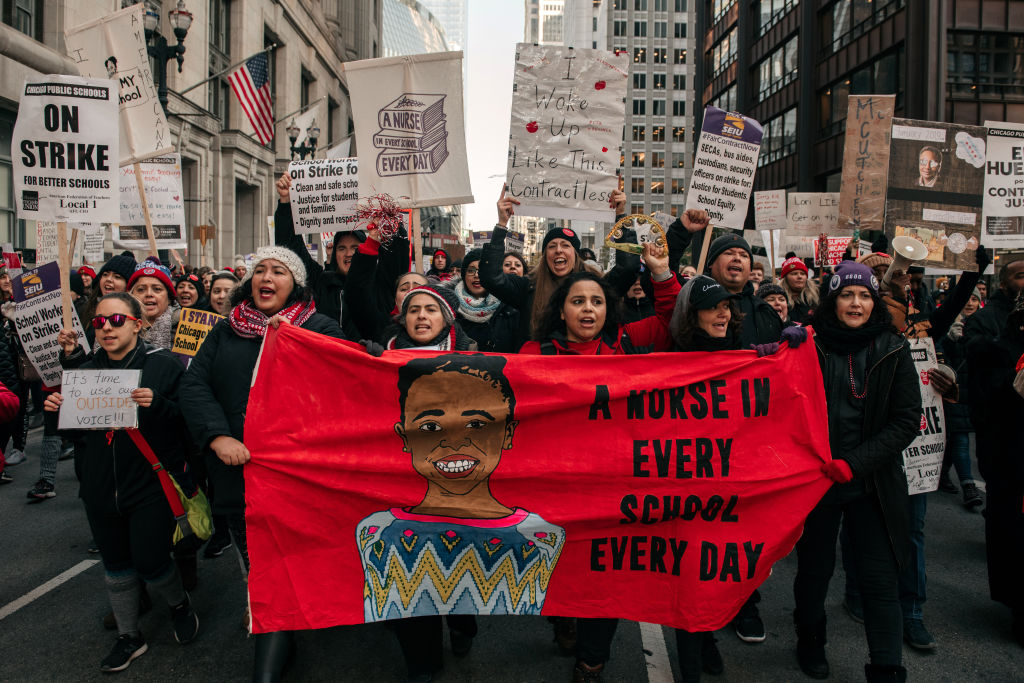There are moments in history when the world teeters on a razor’s edge – we believe we are in such a moment. We must use the current and upcoming fights to transform our world and Bargaining for the Common Good (BCG) is an essential tool in that effort.
A Call to Action
When we started to prepare this special Bargaining for Common Good issue of The Forge, we planned to issue a call to action and lay out a vision of the many ways community and labor groups can work together locally and nationally for a more just country and world. We think this call to action is all the more important in the face of the COVID-19 pandemic. It has exposed the savage inequality, injustice and failures of our economic and political systems. It calls on all of us to offer a vision of the world we want to create, and lay out concrete steps to address the immediate impact of the pandemic and economic collapse, growing racism and xenophobia. We need to demonstrate through action how these steps create the possibility of organizing and winning a more just and equal country and world.
When we look back in history, we see that economic collapse, war, and other national and global crises, with all of their horrors, can nonetheless create conditions for radical transformational change for the good. The Great Depression gave rise to the New Deal which stabilized the economy, created millions of jobs and expanded home ownership (though it’s critical to note that people of color were denied access to home ownership opportunities via redlining); World War II helped workers double the unionization rate in basic industry and reinforced demands for racial equality; the backdrop of the Cold War gave Civil Rights protestors leverage to demand that America live up to its claimed global democratic leadership.
Unfortunately, history also shows that rich elites will use crises to build their own prosperity, control and power, increasing inequality and division. We only have to look back to the 2008 economic collapse to see progressive opportunities squandered and how easily we fell into the trap of seeking a return to the pre-crisis “normal” as the best we could hope for. All the issues of inequality, lack of healthcare, homelessness, racism, and climate change that weren’t addressed after the Great Recession have magnified and exacerbated the impact of the pandemic.
There are moments in history when the world teeters on a razor’s edge–where we can simultaneously imagine a world remade based on equality, justice and collective liberation and yet risk descending into a dystopian world of disaster capitalism, hyper inequality, exploding racism and patriarchy and political repression. We believe we are in such a moment.
While emergency funds trickle to communities, we know on the other side of this pandemic, we will face massive calls for austerity, attacks on the public sector, pension crises, cuts to important social programs, and calls for public and private sector unions to make contract concessions. The question for our movements and our communities is this: Is our goal to return to the “normal” pre-pandemic world of inequality, racism, and corporate domination or to imagine, organize, and fight for the world we want to create and deserve?
We need a strategy for workers and their allies to address the failures of 21st century capitalism that have brought us to this troubled moment, and that can move us to the future we need. We believe there are interrelated areas of work that feed off of and support each other that we can start working on together now, as part of a Bargaining for the Common Good framework:
Acting Now
We need to do everything possible to deal with COVID-19’s immediate impact on our communities, workplaces, and jobs. Initial common good demands from the United Teachers of Los Angeles, the Chicago Teachers Union and their allies and the Massachusetts Teachers Association and Boston Teachers’ Union to stop evictions and foreclosures, provide sick pay and cease all detentions and deportations by ICE, combined with militant action like the home occupations in California, are demonstrating we can win victories at a state and local level that can push changes at a federal level. Local unions and community organizations continue to release common good platforms responding to the crisis.
Critical to this work is creating a frame and narrative that these fights are only the first steps. They are limiting damage, but are not the solution. Our movements can use these demands and victories as organizing and power-building moments that set the stage for bigger, transformational demands and fights. If we can win short-term protection from evictions, why not long term? If we can win utility shut-offs, why not publicly-owned, sustainable water and electric utilities? Short term paid sick leave for some should be the first step in a fight for a comprehensive national paid sick program; the same goes for health care. The proposed stimulus package shouldn’t be funding bailouts for fossil fuel industries and should instead fund what many of us have long fought for — a Green New Deal and just transition to a sustainable economy that works for all of us.
We must use the upcoming fights — battles about economic stimulus, financial support for those most impacted by the economic collapse, corporate bailouts, and the elections — to fight for transformative common good demands, challenge Wall Street, break up big banks and monopolies, and inaugurate a Green New Deal. History has shown us that organizing and battles during times of crisis can create the solidarity, hope, and movement needed to win long-term change.
Go on Offense to Develop an Ambitious Post-Pandemic and 2020 Election Strategy
Corporations and the super rich have a plan for how to come out on top after the initial crisis passes — just as they did after the Great Recession. They were richer and more powerful after the recovery of the crisis they created. We cannot afford a repeat of the demobilization that occurred after the election of Barack Obama in 2008. We must lay out an ambitious agenda for pandemic recovery and post-election action.
During 2021 and 2022, over 3 million workers will be bargaining in a climate where public and private employers will be demanding austerity and insisting working people make concessions. This will be a critical test. Do we fall into the trap of trying to limit concessions or do we go on offense and use critical bargaining and organizing campaigns to fight for real, transformative, and systemic economic and political change?
Organizing and Bargaining Together for the Common Good
We propose a simple idea: let’s use the natural alignment of contract expirations around the country to make common good demands in every sector of the economy and geography of the country. Imagine the energy, excitement and movement we can build together if dozens of common good campaigns mirrored, magnified and built on the strikes of the last few years, including UTLA in Los Angeles, AFSCME 3299 at the University of California and teachers and support staff in Chicago. What if this was happening all over the country? Imagine if hundreds of community groups and unions engaged in overlapping campaigns and potential strikes over coordinated common demands, building on those local coalitions have pursued across the country such as all unused land and residential housing being dedicated to affordable housing, divestment from private prisons, detention and fossil fuels, and equitable funding for all schools. Imagine if the combination of common good demands painted a picture and told the story of the world we want to create in contrast to corporate and political demands for austerity.
Mapping our opportunities to build to mass action in 2022
To prepare for the post-2020 challenge, we are now building an interactive map that will give all of us the ability to see contract expirations over the next several years for over 3 million people. This tool will allow community groups and unions to see where there are big negotiations – we can start planning now around how our struggles support each other and creating common demands.
We know the rich and powerful corporations are already planning to consolidate their wealth, control and power on the other side of this pandemic. It is our job and responsibility to organize now and prepare for ferocious battles that will define the future of our country and world.
As you read this Bargaining for the Common Good (BCG) issue of the Forge, you’ll see the breadth of the possibilities this strategy creates. Unions and community organizations across the country that pioneered the BCG approach have created powerful demands we can draw on. We believe these kinds of far reaching demands, combined with escalating work this year and in 2021, set the stage for the kind of mass organizing, bargaining, legislative action and strikes needed to dramatically impact the future of our country.
The world we knew before COVID-19 is quickly passing. We are seeing incredible acts of hope, love and generosity, and a dedication to the collective – the common good. We need to build on this energy to confront those that seek to further systemic inequality and racism. We have the power to transform our world and Bargaining for the Common Good is an essential tool in that effort. The time has come for us to stand together to do everything in our power to fight for the common good.

